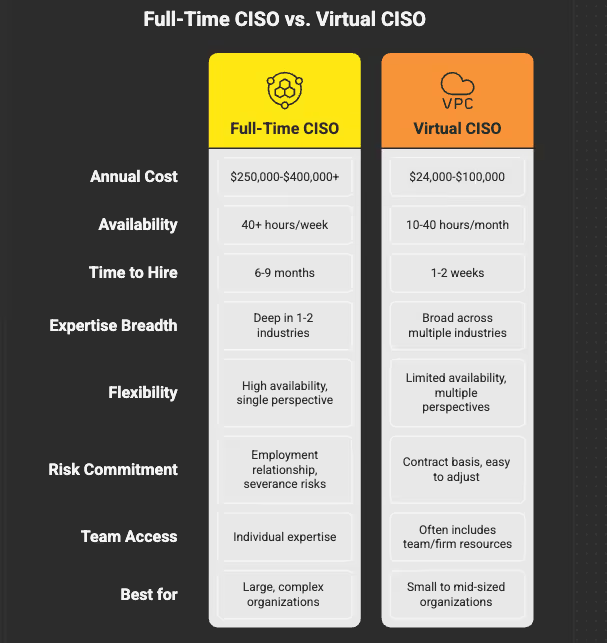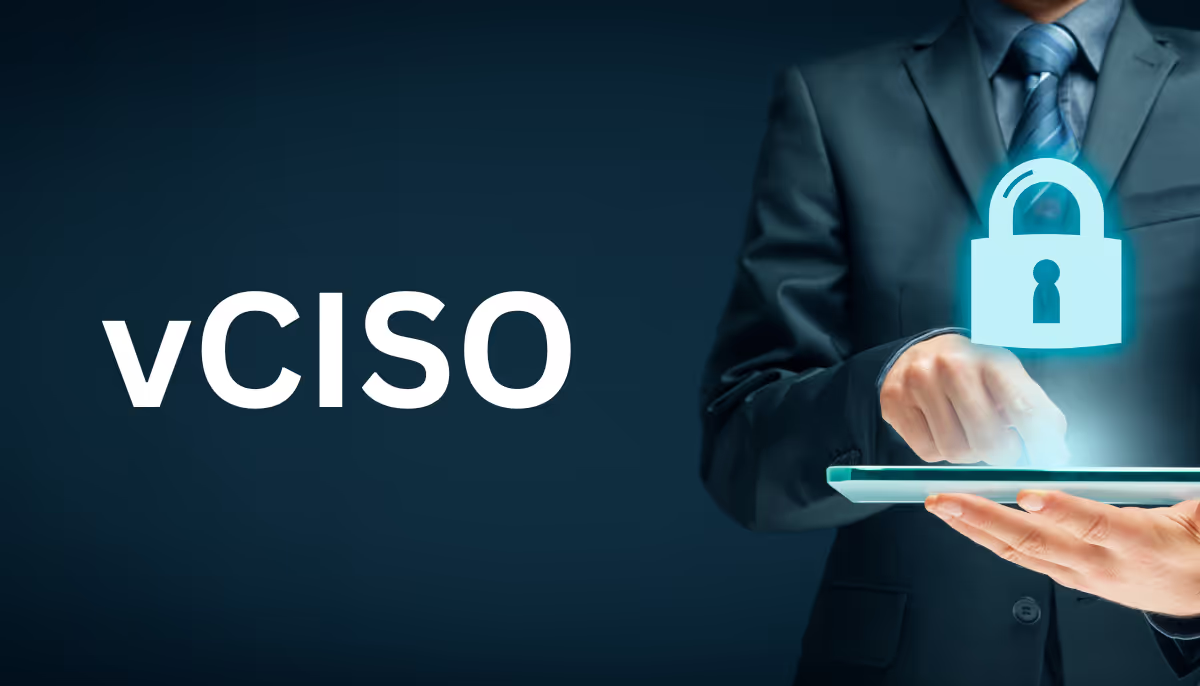Author: Marçal Santos, vCISO | +20 Years Cybersecurity Experience
Introduction: The Rise of Virtual Chief Information Security Officers
In today's digital landscape, cybersecurity breaches cost businesses an average of $4.45 million per incident according to IBM's 2025 Cost of a Data Breach Report. Yet, small and medium-sized businesses face a critical challenge: they need expert security leadership but cannot afford the $175,000-$300,000 annual salary of a full-time Chief Information Security Officer (CISO). Enter the Virtual CISO (vCISO) – a game-changing solution that's transforming how organizations approach cybersecurity leadership.
This comprehensive guide will walk you through everything you need to know about vCISO services – from understanding what they do and how they work, to evaluating costs, and maximizing the value of this strategic investment for your organization.
Key Takeaways: What You'll Learn About Virtual CISO Services
- Cost Efficiency: Virtual CISO services cost 60-70% less than full-time CISOs while delivering equivalent expertise and strategic value for small to mid-sized organizations
- Immediate Access to Expertise: Get instant access to seasoned security professionals with 15-25 years of experience across multiple industries and compliance frameworks
- Flexible Engagement Models: Choose from retainer-based (10-40 hours/month), project-based, or on-demand services starting at $3,000-$15,000 monthly
- Comprehensive Security Leadership: Receive strategic planning, risk assessments, compliance management, policy development, and board-level reporting without overhead costs
- Scalable Solutions: Easily adjust service levels as your organization grows, adding or reducing hours based on evolving security needs and budget constraints
- Proven ROI: Organizations using vCISO services report 40-60% reduction in security incidents and 25-35% faster compliance achievement compared to managing security ad-hoc
What is a Virtual CISO (vCISO)?
A Virtual Chief Information Security Officer (vCISO), also known as a fractional CISO or CISO-as-a-Service, is an outsourced cybersecurity executive who provides strategic security leadership to organizations on a part-time, contract, or project basis. Unlike full-time CISOs who work exclusively for one company, vCISOs serve multiple clients simultaneously, bringing cross-industry expertise and best practices to each engagement.
The Core Concept Explained
Think of a vCISO as having a senior cybersecurity executive on retainer – you get the strategic thinking, compliance expertise, and leadership capabilities of a seasoned CISO without the full-time salary, benefits package, or overhead. According to Cynomi's 2024 State of the vCISO report, 98% of managed service providers now offer or plan to offer vCISO services due to overwhelming client demand.
Key characteristics of vCISO services include:
- Fractional Time Commitment: Typically 10-40 hours per month dedicated to your organization's security needs
- Strategic Focus: Emphasis on high-level security strategy, governance, and risk management rather than day-to-day operations
- External Perspective: Fresh eyes on security challenges with experience from multiple industries and company sizes
- Vendor-Neutral Guidance: Unbiased technology and service recommendations based solely on your organization's needs
- Executive Communication: Skilled at translating technical security concepts for board members and non-technical stakeholders
What vCISOs Are NOT
It's important to understand that vCISOs are not hands-on security technicians. They don't monitor security logs, configure firewalls, or respond to daily security alerts. Instead, they provide the strategic direction, policies, and oversight that guide your internal IT team or managed security service provider. vCISOs focus on governance, strategy, and compliance while tactical operations remain with your technical staff.
The Evolution of vCISO Services
The vCISO concept emerged in the early 2010s as cybersecurity threats intensified but qualified security executives remained scarce and expensive. What began as consultants offering part-time advisory services has evolved into comprehensive, structured programs with defined deliverables, regular engagement schedules, and measurable outcomes. Today's vCISO services represent a mature market segment with established methodologies and proven track records.
Key vCISO Roles and Responsibilities
Understanding what a vCISO actually does is crucial for setting proper expectations and maximizing value from the engagement. Virtual CISOs fulfill strategic leadership roles rather than tactical implementation tasks, successful vCISO engagements focus on seven core responsibility areas.
1. Security Strategy Development and Governance
2. Risk Assessment and Management
3. Compliance Management and Regulatory Alignment
4. Security Policy and Procedure Development
5. Incident Response Planning and Crisis Management
6. Security Technology and Architecture Guidance
7. Security Team Leadership and Development
vCISO vs. Full-Time CISO: Understanding the Differences
Choosing between a virtual CISO and a full-time CISO is a critical decision with significant financial and strategic implications. According to Scytale's comparison analysis, the right choice depends on organizational size, complexity, budget, and security maturity level.
When to Choose a Full-Time CISO
Full-time CISOs make sense for organizations meeting most of these criteria:
Organizational Characteristics:
- 300+ employees requiring extensive security awareness and management
- Highly regulated industries with constant audit and compliance demands (financial services, healthcare, government)
- 24/7 security operations requiring constant executive availability
- Multiple locations or business units needing coordinated security oversight
- Previous security incidents requiring intensive remediation and board scrutiny
When to Choose a Virtual CISO
Virtual CISOs provide optimal value for organizations with these characteristics:
Organizational Profile:
- 50-1,000 employees requiring strategic security guidance
- Limited security budget under $500,000 annually
- Growing security requirements driven by client demands or compliance needs
- No existing security leadership or recent CISO departure
- Need for immediate expertise without lengthy recruiting processes
Strategic Indicators:
- Pursuing compliance certifications like SOC 2, ISO 27001, or HIPAA
- Responding to client security questionnaires and audit requests
- Seeking cyber insurance requiring documented security programs
- Preparing for due diligence in M&A scenarios
- Board or investor pressure to demonstrate security governance

vCISO Service Models and Engagement Types
Virtual CISO services aren't one-size-fits-all – providers offer various engagement models designed for different organizational needs, budgets, and security maturity levels. Understanding these models helps you select the right structure for maximum value. There are 3 primary engagement models that dominate the market.
1. Retainer-Based vCISO Services
The retainer model is the most common engagement type, providing consistent, ongoing security leadership through predetermined monthly hours.
How It Works:
- Organizations purchase a fixed number of hours per month (typically 10, 20, 30, or 40 hours)
- vCISO allocates time across strategic activities based on priorities
- Regular cadence includes monthly meetings, quarterly assessments, and ad-hoc consultations
- Unused hours may roll over (limited) or expire based on contract terms
Typical Pricing:
- 10 hours/month: $3,000-$5,000 monthly
- 20 hours/month: $6,000-$10,000 monthly
- 30 hours/month: $9,000-$14,000 monthly
- 40 hours/month: $12,000-$18,000 monthly
Best For:
- Organizations needing ongoing strategic guidance rather than one-time projects
- Companies with evolving security programs requiring continuous attention
- Businesses pursuing long-term compliance maintenance (SOC 2, ISO 27001)
- Teams requiring regular executive reporting to boards or leadership
Typical Deliverables:
- Monthly security strategy meetings with leadership
- Quarterly risk assessments and board presentations
- Ongoing policy development and updates
- Vendor evaluation and technology guidance
- Incident response plan development and testing
2. Project-Based vCISO Engagements
Project-based engagements focus on specific, time-bounded initiatives with defined deliverables and outcomes.
Common Project Types:
- Compliance Certification: Achieving SOC 2, ISO 27001, HIPAA, or PCI-DSS certification
- Security Program Launch: Building security program from scratch for organizations with no existing framework
- Incident Response: Post-breach remediation, investigation, and program improvement
- M&A Due Diligence: Security assessment for acquisitions or pre-sale preparation
- Regulatory Response: Addressing audit findings or regulatory deficiencies
- Vendor Risk Assessment: Comprehensive third-party security evaluation programs
Typical Pricing:
- SOC 2 Type I Preparation: $9,000-$20,000 (3-6 month project)
- ISO 27001 Certification: $9,000-$25,000 (6-12 month project)
- Security Program Build: $9,000-$18,000 (4-8 month project)
- Incident Response Support: $10,000-$25,000 (1-3 month project)
- M&A Security Assessment: $8,000-$20,000 (1-2 month project)
Best For:
- Organizations with specific compliance deadlines requiring focused effort
- Companies responding to client or investor demands for security certifications
- Businesses needing one-time program establishment with plans to manage internally afterward
- Situations with defined budgets and scope requiring predictable costs
3. On-Demand vCISO Services
On-demand models provide flexible access to vCISO expertise for specific questions, reviews, or advisory needs without ongoing commitments.
How It Works:
- Organizations purchase blocks of hours or pay hourly rates
- vCISO responds to specific requests: policy reviews, technology evaluations, meeting attendance
- No ongoing relationship or proactive guidance
- Ideal for organizations with internal security capability needing occasional expert input
Typical Pricing:
- Hourly rates: $200-$400 per hour
- Minimum engagement: Often 10-20 hours initially
Best For:
- Organizations with existing security staff needing expert review or validation
- Companies requiring specialized expertise for specific challenges (privacy, cloud security, OT security)
- Businesses wanting to test vCISO relationship before committing to retainer
- Situations needing board presentation preparation or stakeholder communication support
4. Managed Security Provider (MSP/MSSP) vCISO Programs
Many managed service providers bundle vCISO services with other security offerings:
Integrated Offerings:
- vCISO strategic guidance combined with SOC monitoring, endpoint protection, and vulnerability management
- Single provider for both strategy and operations
- Often bundled pricing with managed security services
- Close integration between strategic direction and tactical implementation
Pricing Models:
- Typically bundled with MSP contracts at $5,000-$20,000 monthly total
- vCISO component often represents 20-30% of total managed services cost
- May include unlimited consultation within scope of managed services
Best For:
- Organizations preferring single-vendor solutions for simplicity
- Companies with limited IT staff needing both strategy and operations support
- Businesses wanting aligned incentives between strategy and execution
- Teams valuing seamless coordination between vCISO and security operations
Frequently Asked Questions (FAQ)
1. What's the difference between a vCISO and a cybersecurity consultant?
A vCISO provides ongoing strategic leadership and executive-level security governance, acting as your organization's chief security officer on a part-time basis. They develop strategy, oversee security programs, report to boards, and provide continuous guidance. A cybersecurity consultant typically focuses on specific projects like penetration testing, security assessments, or tool implementations without ongoing leadership accountability. vCISOs maintain relationships over months or years, while consultants often complete specific engagements and move on.
2. How many hours per month should we expect from a vCISO?
Most organizations need 10-40 hours monthly, depending on size, complexity, and security maturity. Small businesses (50-100 employees) with basic needs often require 10-15 hours monthly. Mid-sized organizations (100-300 employees) pursuing compliance typically need 20-30 hours monthly. Larger companies or those in highly regulated industries may require 30-40+ hours monthly. During initial program builds or audit preparation, hours often increase temporarily before decreasing to steady-state levels.
3. Can a vCISO help us achieve SOC 2 or ISO 27001 certification?
Yes, this is one of the most common vCISO use cases. Experienced vCISOs have guided dozens of organizations through compliance certifications. They provide gap assessments, remediation roadmaps, policy development, evidence collection, auditor coordination, and preparation support.
4. What's the average cost of vCISO services?
vCISO services typically cost $3,000-$18,000 monthly for retainer-based engagements, or $150-$400 per hour for on-demand consultation. See the vCISO model section for detailed pricing breakdowns.
5. Will a vCISO work with our existing IT team and vendors?
Absolutely – collaboration is essential to vCISO success. Effective vCISOs work alongside your IT staff, managed service providers, security vendors, and other technology partners. They provide strategic direction while your team handles implementation and daily operations. vCISOs often mentor and develop internal IT staff, coordinate with managed security providers, evaluate vendor performance, and ensure all parties work toward common security objectives. The best vCISO relationships enhance existing team capabilities rather than replacing them.
6. How do we know if we need a vCISO vs. a full-time CISO?
Choose a vCISO if:
- 50-300 employees
- Security budget under $500,000 annually
- Need expertise immediately (within 1-2 weeks)
- First-time building formal security program
- Pursuing initial compliance certifications
Choose a full-time CISO if:
- 300+ employees
- Security budget exceeds $2 million annually
- Complex, highly regulated environment requiring constant executive attention
- 24/7 security operations requiring immediate executive availability
- Previous significant security incidents requiring intensive ongoing oversight
Many organizations start with vCISO and transition to full-time CISO as they grow, often retaining the vCISO in an advisory capacity during the transition.
Ready to accelerate your security compliance journey without the usual headaches and budget overruns?
At SecureLeap, we've revolutionized the compliance process by bundling everything you need into one seamless experience:
✅ Platform Licenses: Direct access to Vanta, Drata, or Secureframe at competitive rates
✅ Expert vCISO Guidance: 20+ years of hands-on compliance experience
✅ Audit Services: Vetted auditor network with proven track records
✅ Ongoing Support: Continuous monitoring and maintenance to ensure sustained compliance
Why choose SecureLeap over managing multiple vendors?
• Single Point of Contact: No more juggling between platform support, consultants, and auditors
• Transparent Pricing: Fixed-fee packages with no surprise costs or scope creep
• Ongoing Partnership: We're with you for renewals, expansions, and additional certifications
Don't let compliance slow down your enterprise sales momentum. Get a personalized compliance roadmap and pricing in just 30 minutes.
Book Your Strategic Compliance Consultation →
Or
Contact us using this form.




